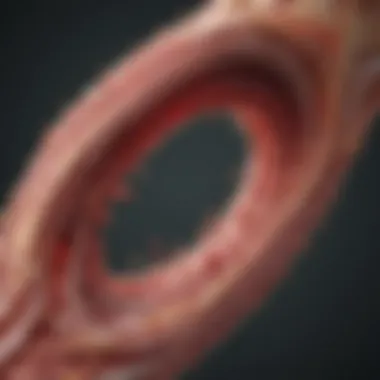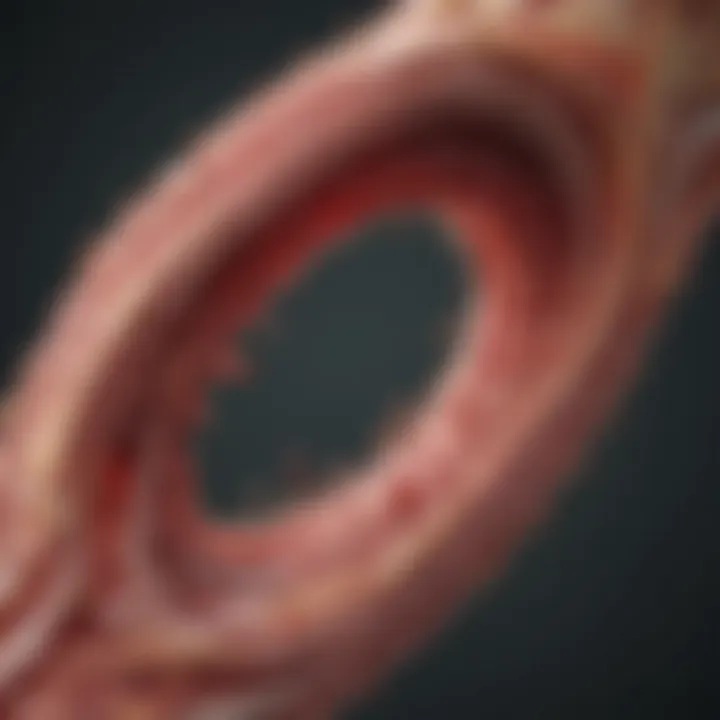Do Statins Effectively Remove Arterial Plaque?


Intro
The debate surrounding the efficacy of statins in managing cardiovascular health, particularly in relation to existing arterial plaque, merits rigorous examination. Statins, primarily known for their ability to lower cholesterol levels, have been prescribed widely to reduce the risk of cardiovascular diseases. However, the question of whether statins can effectively remove plaque buildup in arteries remains a topic of ongoing research and discussion. This article explores the mechanisms of how statins operate, their actual effects on arterial plaque, and the implications for individuals considering this treatment.
Key Concepts and Terminology
Definition of Key Terms
- Statins: A class of drugs that reduce cholesterol levels in the blood, commonly prescribed for cardiovascular disease management.
- Arterial Plaque: A buildup of fats, cholesterol, and other substances in and on the artery walls, which can restrict blood flow.
- Cholesterol: A waxy substance found in the blood, essential for building cells but often linked to heart disease when present in high levels.
Concepts Explored in the Article
In examining the role of statins, critical concepts include:
- The biochemical interaction between statins and cholesterol regulation.
- The potential for statins to reverse plaque buildup or stabilize existing plaques.
- The implications these findings have on treatment strategies for at-risk populations.
Findings and Discussion
Main Findings
Research indicates that statins may impact arterial plaque in various ways. While primarily aimed at reducing low-density lipoprotein (LDL) cholesterol, some studies suggest that statins could have direct effects on existing plaque. Plaque stabilization rather than complete removal appears to be a key outcome of statin treatment. This stabilization can reduce the risk of plaque rupture, which can lead to heart attacks.
Important findings include:
- Statins may reduce the size of plaques to some extent, although the extent varies among individuals.
- Clinical studies show that patients taking statins often exhibit a reduction in the progression of atherosclerosis, the process that leads to plaque formation.
- The use of imaging techniques, such as ultrasound and CT scans, has provided insight into how statin therapy influences plaque characteristics over time.
Potential Areas for Future Research
Ongoing research continues to investigate the specific mechanisms by which statins affect arterial plaque. Potential areas of interest include:
- Comparative studies on different types of statins and their effects on plaque reduction.
- The long-term impact of statin therapy on cardiovascular health outcomes focusing on plaque development.
- The role of lifestyle factors and their interaction with statin effectiveness in managing arterial plaque.
"Understanding how statins influence arterial plaque is vital for developing comprehensive treatment strategies that can improve cardiovascular outcomes for patients."
Prologue to Statins and Cardiovascular Health
Understanding how statins function is crucial for comprehending their role in preventing cardiovascular diseases. Statins are primarily known for their effectiveness in lowering cholesterol levels, which is vital for maintaining heart health. This introductory section highlights the importance of cholesterol management, explains what statins do, and underscores their role in preventive care. The complexity of cardiovascular health requires a nuanced approach to how treatments like statins can fit into overall health strategies.
Overview of Statins
Statins are a class of medications widely utilized to manage cholesterol levels in the bloodstream. They work primarily by inhibiting an enzyme called HMG-CoA reductase, which plays a significant role in the production of cholesterol in the liver. By reducing cholesterol synthesis, statins decrease the overall levels of low-density lipoprotein (LDL) cholesterol, often referred to as "bad" cholesterol. This reduction is crucial because elevated LDL cholesterol is a leading contributor to atherosclerosis, where plaque builds up in the arteries.
Commonly prescribed statins include Atorvastatin, Rosuvastatin, and Simvastatin. These medications have been shown to lower the risk of various cardiovascular events, including heart attacks and strokes.
Importance of Cholesterol Management
Effective cholesterol management is essential for reducing the risk of cardiovascular diseases. High levels of LDL cholesterol are associated with plaque formation in the arteries, which can lead to serious health complications. Managing cholesterol levels can significantly alter the course of a patient’s health.
- Individuals with high LDL cholesterol often face increased risks of heart disease.
- Lowering cholesterol can lead to a decrease in plaque formation and stabilization of existing plaques.
- Statins are not just about lowering numbers; they also play a preventive role in mitigating long-term health issues.


The importance of cholesterol management extends beyond statins; lifestyle changes such as improved diet, exercise, and avoiding tobacco are also critical components.
Role of Statins in Preventive Care
Statins are more than a reactive measure; they play a proactive role in preventive care for individuals at risk of heart disease. The use of statins in preventive care is particularly beneficial for patients with a history of heart disease, those with diabetes, or individuals showing early signs of cardiovascular risk factors.
Incorporating statins into a comprehensive health strategy can lead to:
- Improved heart health.
- Reduction in cardiovascular events in high-risk patients.
- Increased longevity through better management of underlying conditions.
"Statins represent a cornerstone in the prevention of cardiovascular disease, particularly for those at elevated risk."
While these medications are instrumental in managing cholesterol and preventing further complications, they must be part of a broader lifestyle and health strategy for optimal outcomes.
Understanding Arterial Plaque
Understanding arterial plaque is crucial for appreciating the broader context of cardiovascular health and the role of statins. Arterial plaque is a thick, hard deposit that forms inside the arteries. This condition can lead to serious cardiovascular complications, such as heart attacks and strokes. As such, knowing what contributes to plaque formation and its implications is essential for both prevention and management strategies.
Composition of Arterial Plaque
Arterial plaque primarily consists of a mixture of fatty substances, cholesterol, cellular waste products, calcium, and fibrin. Lipids, particularly low-density lipoprotein (LDL) cholesterol, play a significant role in plaque development. When LDL levels increase in the bloodstream, they can infiltrate the artery walls. This process triggers inflammation and facilitates the deposition of other substances, leading to plaque buildup. The presence of immune cells, such as macrophages, contributes to this dynamic process. These cells ingest oxidized LDL but eventually die, leading to more plaque accumulation. Understanding this composition is vital because it underscores the importance of cholesterol management in preventing and treating arterial plaque.
Mechanisms of Plaque Formation
Plaque formation is a complex, multifactorial process. It begins with endothelial dysfunction, where the inner lining of the arteries gets damaged. This damage can be due to various factors, including high blood pressure, smoking, and diabetes. Once the endothelium is compromised, LDL cholesterol can penetrate and accumulate in the arterial wall.
The immune response is a key player in this process; the body perceives the oxidized LDL as a threat, which leads to the recruitment of immune cells. As these cells attempt to digest the oxidized particles, they become overloaded and form the core of the plaque. Over time, fibrous tissue encapsulates this core, leading to a stable plaque capable of restricting blood flow. Understanding these mechanisms not only clarifies how plaques form but also informs treatment options, including the role of statins that act on cholesterol levels.
Consequences of Plaque Accumulation
The buildup of arterial plaque leads to a narrowing of the arteries, causing a condition known as atherosclerosis. This narrowing restricts blood flow, which can result in various complications. Potential consequences include chest pain, known as angina, and an increased risk of heart attack and stroke. If a plaque ruptures, it can form a blood clot that obstructs blood flow to the heart or brain, leading to severe outcomes.
Moreover, the size and stability of the plaque determine its risk profile. Stable plaques may not cause immediate health issues, whereas unstable plaques are more likely to rupture. This distinction is critical in understanding why some individuals experience acute cardiovascular events while others do not despite similar risk factors.
Proper knowledge and understanding of arterial plaque are key to developing effective management strategies for cardiovascular health.
Mechanisms of Statins in the Body
Understanding the mechanisms through which statins operate is essential in evaluating their efficacy in cardiovascular health, particularly regarding arterial plaque management. Statins primarily work by reducing cholesterol levels, but their influence extends beyond mere cholesterol modulation. They have significant roles in inflammation reduction and supporting endothelial function. Each of these actions contributes to the overall effectiveness of statins in cardiovascular health.
Cholesterol Synthesis Inhibition
Statins inhibit cholesterol synthesis by blocking the HMG-CoA reductase enzyme, which is crucial for cholesterol production in the liver. This inhibition results in lower levels of LDL (low-density lipoprotein) cholesterol, often termed "bad cholesterol." A reduction in LDL cholesterol has been linked to a decrease in plaque formation within the arteries, thereby reducing the risk of cardiovascular events.
Additionally, with reduced cholesterol synthesis, the liver increases the number of LDL receptors on its surface. This increase enhances the liver's ability to remove LDL from the bloodstream. This process can lead to a significant reduction in plaque accumulation over time.
Anti-Inflammatory Effects
Statins also exhibit anti-inflammatory properties, which contribute significantly to their role in cardiovascular health. Inflammation plays a key role in the development and progression of atherosclerosis—the condition characterized by plaque buildup in the arteries. By stabilizing the endothelium, statins help prevent plaque rupture, a critical event that can lead to heart attacks and other severe cardiovascular issues.


Research indicates that statins lower levels of inflammatory markers such as C-reactive protein (CRP). This reduction suggests an overall improvement in vascular health. The anti-inflammatory effects can also lead to a more stable plaque composition, less prone to destabilization and rupture.
Impact on Endothelial Function
Endothelial function is essential for maintaining vascular health. Statins positively impact this aspect by improving endothelial cell function. A healthy endothelium regulates blood flow and maintains the balance between vasodilation (widening blood vessels) and vasoconstriction (narrowing blood vessels). Improved endothelial function can enhance blood flow and decrease the risk of cardiovascular events.
Moreover, by enhancing nitric oxide production, statins induce vasodilation, which helps reduce blood pressure and improve overall cardiovascular health. This effect further contributes to the reduction of arterial plaque.
In summary, statins influence multiple mechanisms, including cholesterol synthesis inhibition, anti-inflammatory effects, and improved endothelial function. These actions collectively contribute to their potential in managing arterial plaque and reducing cardiovascular risks.
Understanding these mechanisms is critical for anyone considering statins as a treatment option. It highlights the importance of regular monitoring and the potential for tailored therapeutic strategies in managing cardiovascular health.
Research Overview: Statins and Plaque Reduction
The exploration of statins' role in reducing arterial plaque is essential for understanding cardiovascular health. Statins are commonly prescribed to maintain cholesterol levels, but their potential in addressing already existing plaque is still being studied. Identifying the mechanisms involved allows for a better assessment of their benefits and limitations.
In this section, we will delve into various clinical studies, analyze findings regarding plaque volume reduction, and consider the wider implications of stabilizing plaque within arteries. Each aspect can alter treatment strategies and patient outcomes significantly.
Clinical Studies on Statins
Numerous studies have been performed to ascertain how effective statins are in dealing with arterial plaque. Research generally focuses on two principal outcomes: the changes in cholesterol levels and corresponding alterations in plaque volume. A significant body of evidence suggests that statins not only lower LDL cholesterol but may also have a role in plaque regression.
A prominent study published in the Journal of the American College of Cardiology highlighted that patients on high-intensity statin therapy showed notable reductions in plaque volume compared to those on lower doses. Furthermore, trials like the ASTEROID trial illustrated that aggressive cholesterol management with rosuvastatin led to a measurable decrease in atheroma volume, supporting the idea that statins could actively impact plaque rather than simply prevent its growth.
Findings on Plaque Volume Reduction
Statin therapy has demonstrated the ability to impact plaque beyond mere stabilization. Research data indicates that there can be a reduction in the volume of atherosclerotic plaques over time. A systematic review in Circulation outlined how various statin medications successfully worked to reduce plaque burden in patients across a spectrum of cardiovascular risk.
The results of diagnostic imaging techniques, specifically intravascular ultrasound, have shown promise in this regard. Patients receiving regular statin treatment exhibited not just stabilization, but actual regression of plaque, suggesting a broader application of these medications in managing cardiovascular risks.
Implications of Plaque Stabilization
The stabilization of arterial plaque associated with statin use has profound implications. When plaque is stabilized, it is less likely to become unstable and cause acute cardiovascular events like heart attacks or strokes. Studies have shown that patients experiencing stabilized plaque, along with decreased cardiac events, benefit from reduced mortality rates.
Furthermore, the implications extend into public health strategies. If statins are proven effective not only in managing cholesterol but also in reducing the risk of cardiovascular events through plaque management, this may warrant revisions to current treatment protocols. Doctors might consider more aggressive statin therapy for certain populations, driving further investigation into optimal dosing and monitoring.
Overall, the ongoing research in this area holds promise for better cardiovascular outcomes and lends itself to a shifting landscape of treatment considerations.
Limitations of Statins in Treating Plaque
Understanding the limitations of statins in treating arterial plaque is critical. Statins are primarily known for their role in lowering cholesterol levels, yet their efficacy in reducing or stabilizing existing plaque is complex. While these medications have benefits, there are factors like patient variability and side effects that need careful examination. This section elucidates the significance of recognizing these limitations.
Variability in Patient Response
Not all patients respond similarly to statin therapy. The variability in individual response is influenced by multiple factors, including genetics, lifestyle, and concurrent medical conditions. Some patients may experience significant reductions in low-density lipoprotein (LDL) cholesterol and noticeable changes in plaque measurement. In contrast, others may see little to no change in their condition.
- Genetic Factors: Genetic variations can influence how statins are metabolized, impacting their effectiveness.
- Lifestyle Choices: Factors like diet and exercise can modify the results of statin therapy.
- Coexisting Conditions: Conditions such as diabetes or metabolic syndrome can complicate the relationship between statin use and plaque response.
Inconsistencies in how plaque responds to statin therapy suggest a need for personalized approaches. This consideration underscores the importance of tailored care in achieving optimal health outcomes for patients.


Side Effects and Long-term Use
Another aspect of the limitations of statins is the potential side effects associated with their long-term use. While most individuals tolerate statins well, others experience adverse effects that can limit usage or necessitate a switch to alternative therapies.
Common side effects may include:
- Muscle pain or weakness (myopathy)
- Liver enzyme elevation
- Gastrointestinal issues
The risk of experiencing side effects often raises concerns about prolonged statin therapy. Studies have indicated that some patients may discontinue their medications due to side effects, which could, in turn, affect plaque stability and overall cardiovascular health.
Long-term use of statins also raises questions about safety. Ongoing research is crucial to better understand the risk-benefit profile over extended periods of use. Statins may not remove existing plaque, but understanding these limitations helps frame a more nuanced perspective on their role in cardiovascular care.
"Recognizing the limitations of medication is essential for patient management."
Alternative Approaches to Plaque Management
In the context of cardiovascular health, understanding approaches to manage arterial plaque is essential. While statins are often the first line of defense against high cholesterol and plaque buildup, they are not the sole option available. Exploring alternative methods can provide a more comprehensive strategy, especially for individuals who may not respond well to statins or wish to enhance their overall cardiovascular health in conjunction with medication. This section will discuss lifestyle modifications and non-statin medications, focusing on their specific elements, benefits, and considerations.
Lifestyle Modifications
Lifestyle changes play a critical role in managing arterial plaque and overall cardiovascular health. Proper diet, exercise, and other habits can significantly impact the health of blood vessels and cholesterol levels.
- Dietary Changes: A heart-healthy diet usually includes fruits, vegetables, whole grains, and lean proteins. Foods rich in omega-3 fatty acids, like salmon and walnuts, can help reduce inflammation and improve heart health. Reducing saturated fats, trans fats, and cholesterol intake is crucial to control plaque formation.
- Regular Exercise: Engaging in regular physical activity can lower LDL cholesterol (low-density lipoprotein), which is harmful, and can raise HDL cholesterol (high-density lipoprotein), which is protective. Aim for at least 150 minutes of moderate aerobic exercise each week, such as brisk walking or cycling.
- Weight Management: Maintaining a healthy weight decreases the strain on the heart. Obesity is a major risk factor for increased plaque buildup in arteries. Even modest weight loss can have a beneficial effect on heart health.
- Smoking Cessation: Smoking is known to damage blood vessels, accelerate plaque buildup, and increase the risk of heart disease. Quitting smoking can dramatically improve cardiovascular health and reduce the likelihood of plaque-related complications.
- Stress Reduction: Chronic stress can contribute to heart health issues. Techniques such as mindfulness, yoga, and deep-breathing exercises can help manage stress levels effectively.
Adopting these lifestyle changes can not only assist in managing arterial plaque but may also enhance the overall effectiveness of any medical treatments, including statins.
Non-statin Medications
For individuals who either cannot tolerate statins or whose conditions require stronger intervention, several non-statin medications are available. These alternatives target cholesterol levels and arterial health in various ways.
- Ezetimibe: This medication works by preventing the absorption of cholesterol from the intestine. By reducing the amount of cholesterol entering the bloodstream, ezetimibe can complement statin therapy or serve as a primary treatment for patients unable to take statins.
- PCSK9 Inhibitors: Medications like alirocumab and evolocumab target a protein that affects cholesterol levels. By inhibiting this protein, these medications can lower LDL cholesterol significantly. They are typically administered through injections and are especially useful for those with familial hypercholesterolemia.
- Bile Acid Sequestrants: Medications such as cholestyramine work by binding bile acids in the intestine. This binding forces the liver to use more cholesterol to produce new bile acids, thereby lowering cholesterol levels in the blood.
- Fibrates: Another class of drugs that focus on lowering triglycerides and, to some extent, raising HDL cholesterol. Examples include fenofibrate and gemfibrozil.
- Niacin: This B vitamin can increase HDL cholesterol and lower LDL cholesterol and triglycerides, but it is usually less favored due to side effects.
These non-statin options provide additional pathways for individuals managing arterial plaque.
"It’s essential for patients to work closely with healthcare providers to select the most suitable medication based on their unique health profiles, preferences, and response to treatments."
Closure and Future Directions
The examination of statins and their role in managing arterial plaque represents a significant intersection of pharmacology and cardiovascular health. This section elucidates the crucial aspects of the ongoing dialogue regarding statins, their implications for patient care, and the path forward in research and application.
Summary of Findings
Throughout this article, we have explored the multifaceted role of statins in cardiovascular health. Statins are primarily known for their function as cholesterol-lowering agents; however, their effects extend beyond mere cholesterol reduction. While statins help stabilize existing plaques and may even contribute to some degree of plaque regression, they do not entirely eliminate plaque from arteries. Clinical studies demonstrate that statins can lead to a reduction in the overall plaque volume, but these outcomes are variable among individuals. The type of statin, dosage, and patient-specific factors all influence this response.
Key findings include:
- Statins have been shown to lower LDL cholesterol efficiently, which can assist in controlling plaque development.
- Evidence suggests that statins possess anti-inflammatory properties, which may protect against plaque rupture, a serious cardiovascular event.
- Despite benefits, some patients experience side effects that can affect adherence to these medications.
Evolving Research Landscape
Research into the role of statins continues to evolve. While large-scale clinical trials have provided foundational knowledge, newer studies aim to uncover deeper insights into statin efficacy and safety. Current investigations are examining:
- The potential for newer statins or combination therapies that could provide enhanced plaque management.
- Biomarkers that may indicate how effectively an individual will respond to a specific statin therapy.
- Effects on arterial health beyond plaque, such as improvements in endothelial function and reduced vascular inflammation.
- Long-term impacts of statin use, especially in populations that have not been extensively studied, such as younger patients or those with specific metabolic conditions.
These research directions could significantly alter our understanding and management of cardiovascular health. As insights accumulate, clinicians may able to offer more personalized treatment plans that optimize patient outcomes with minimized risks.
"The journey of knowledge is endless; every answer leads to new questions."







